The Rosary Murders Blu-ray Movie
HomeThe Rosary Murders Blu-ray Movie 
Kino Lorber | 1987 | 105 min | Rated R | Mar 01, 2016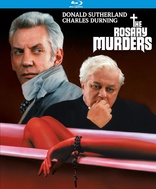
Movie rating
5.9 | / 10 |
Blu-ray rating
| Users | 0.0 | |
| Reviewer | 3.0 | |
| Overall | 3.0 |
Overview
The Rosary Murders (1987)
A priest is put in a dilemma when the serial killer who has been murdering priests and nuns confesses to him.
Starring: Donald Sutherland, Charles Durning, Belinda Bauer, Josef Sommer, James MurtaughDirector: Fred Walton (II)
| Mystery | Uncertain |
| Thriller | Uncertain |
| Crime | Uncertain |
| Drama | Uncertain |
Specifications
Video
Video codec: MPEG-4 AVC
Video resolution: 1080p
Aspect ratio: 1.85:1
Original aspect ratio: 1.85:1
Audio
English: DTS-HD Master Audio 2.0 (48kHz, 16-bit)
Subtitles
None
Discs
25GB Blu-ray Disc
Single disc (1 BD)
Playback
Region A (B, C untested)
Review
Rating summary
| Movie | 2.0 | |
| Video | 3.5 | |
| Audio | 3.0 | |
| Extras | 1.0 | |
| Overall | 3.0 |
The Rosary Murders Blu-ray Movie Review
Reviewed by Brian Orndorf February 22, 2016It’s somewhat surprising that the Catholic Church would want anything to do with “The Rosary Murders,” with production access to churches repaid with a strangely condemning screenplay that depicts holy leaders as dim, corrupt figures bound by absurd organizational laws. However, general disapproval of religious practices and leadership is the least of the 1987 picture’s problems, finding its approach to big screen mystery strangely lethargic, taking an uneventful route when detailing a serial killer’s rampage across Detroit. “The Rosary Murders” has the tools to generate passable thrills with a decent whodunit, but director Fred Walton (“April Fool’s Day,” “When a Stranger Calls”) doesn’t provide the energy needed to bring the story to life. Much of the movie is put in star Donald Sutherland’s hands, tasked with maintaining emotional depth and procedural surprise. The actor is good here, at least restless enough to keep the viewing experience from slipping into a coma, but he’s no miracle worker.
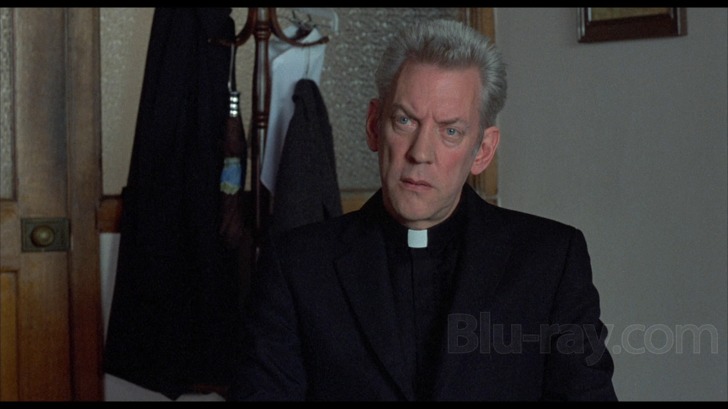
In the heart of Detroit, someone is stalking the local churches and Catholic businesses, killing priests and nuns, leaving a rosary in their dead hands as a message to investigators. In the middle of the madness is Father Robert (Donald Sutherland), a kindly priest working at the Holy Redeemer Church, where the death of a young nun about to leave the faith pulls him into the case. Local cops are powerless, unable to come up with a motive, while reporter Pat (Belinda Bauer) is interested in helping, but shows more interest in Robert than the details of the crimes. After hearing the killer’s confession one afternoon, Robert comes to terms with his professional limitations after receiving such crucial information, unable to go to law enforcement with his knowledge. Setting out on his own, Robert begins to put together clues and chase interviews, struggling with motive as more of his colleagues are killed, taking concerns to his boss, Father Ted (Charles Durning).
“The Rosary Murders” is adapted from a William X. Kienzle novel, with screenplay credits shared by Walton and Elmore Leonard (who later admitted that he joined the project as a favor to the producer). Despite sizable talent in the storytelling department, the feature never positions itself with any clarity, commencing the tale with the murder of a priest inside a Catholic hospital, but never rising above the initial reveal, failing to create a snowballing sensation as bodies pile up and Detroit’s finest are put on edge, unable to find the killer. “The Rosary Murders” locates a blah tone and remains there, shuffling around multiple subplots without committing to anything in full, trusting the main draw of a serial killer saga will be a sufficient buttress as the rest of the effort tries to remain as immobile as possible.
The “Rosary Killer” has no cinematic pull, with his victims picked off in locations like a confessional booth and a bathtub, while one priest is hit by a car while jogging around an industrial area. Escalation isn’t a priority to Walton, who shows more interest in Robert’s crisis of faith as the priest turns into a detective, struggling with his duty to the church and his sense of justice, trying to avoid additional death. The squeezing of the priest’s conscience has potential (a church official tells him that they’re “saving souls, not saving lives”), threatening to give “The Rosary Murders” thematic depth as Robert is trapped by his religion, unable to break the confessional seal and help the police. However, the screenplay introduces this confusion and quickly ignores it, joining a list of ideas that never come to fruition in the glacially paced mystery.
Perhaps the most pronounced question mark of “The Rosary Murders” belongs to Pat, a spunky reporter with a local newspaper who tags along with the police investigation, though she’s never one to take notes or ask questions. In a wildly improbable subplot, an attraction of sorts is introduced between Pat and Robert, teased throughout the first half of the film through knowing looks and a time spent together. This connection is clumsily staged and edited, never making complete sense, with its purpose to warm the feature up with a taboo attraction missing wildly, only adding more confusion to a periodically bewildering movie. It appears that Pat was once an integral character in “The Rosary Murders,” but the final edit gently pushes her aside to make room for Robert’s sleuthing and multiple scenes of the killer picking off his victims.
Robert’s foray into detective work doesn’t amplify “The Rosary Murders” as it should, glumly going along with the priest as he breaks into houses to search for clues and interview colleagues, inching closer to a reveal that’s not terribly shocking. The production makes a crucial mistake by revealing the killer’s identity midway through the picture, which effectively erases what little here even tries to achieve suspense. The rogue priest angle is there for the taking as well, yet Walton doesn’t add excitement to the mix, or even basic chills, finding deadly encounters missing inspired execution.
The Rosary Murders Blu-ray Movie, Video Quality 
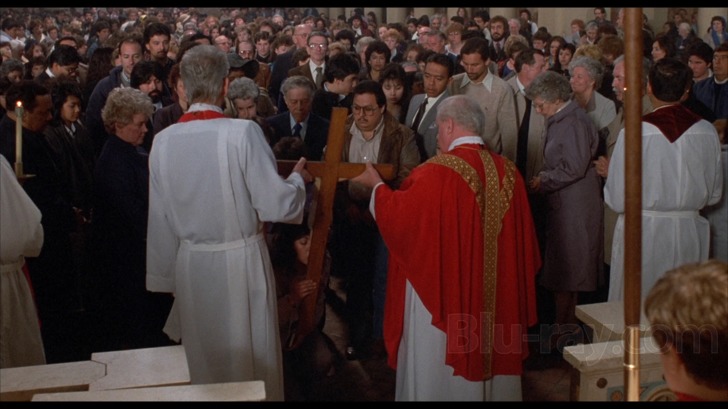
The AVC encoded image (1.85:1 aspect ratio) presentation on "The Rosary Murders" deals with a degree of age, finding detail not as fresh and crisp as it could be, leaving more interesting textures on close-ups and ornamented interiors. Colors are adequate, never remarkable, handling the wintry look of the feature with passable hues, finding church official costumes perhaps the most memorable. Delineation isn't threatened, working through evening sequences and dense clothing with clarity. The source is in decent shape, without any major points of damage.
The Rosary Murders Blu-ray Movie, Audio Quality 
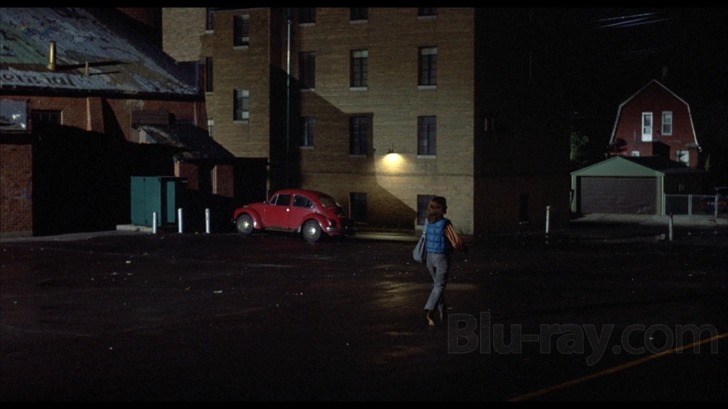
The 2.0 DTS-HD MA sound mix provides a basic listening experience, offering emphasis on dialogue exchanges, which suffer from a touch of muddiness, never registering with a proper amount of clarity. Dramatic extremes remain within a comfortable range, and intelligibility isn't jeopardized, but crispness is lacking. Scoring supports with a piano mood, delivering adequate instrumentation and respectful positioning. Atmospherics are welcome, preserving echoed environments and group activity, with some mild directional activity.
The Rosary Murders Blu-ray Movie, Special Features and Extras 
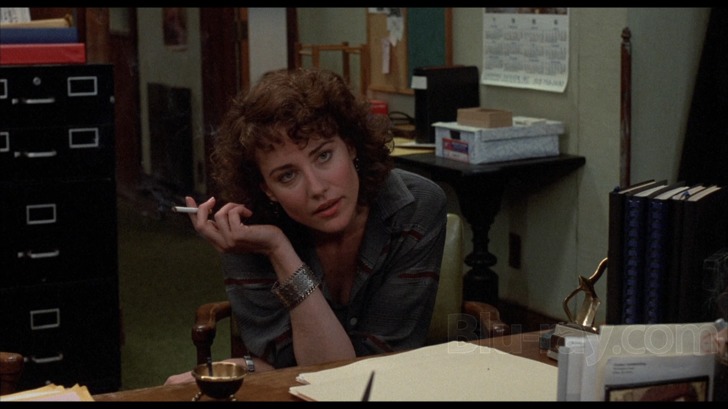
- A Theatrical Trailer (2:18, HD) is included.
The Rosary Murders Blu-ray Movie, Overall Score and Recommendation 
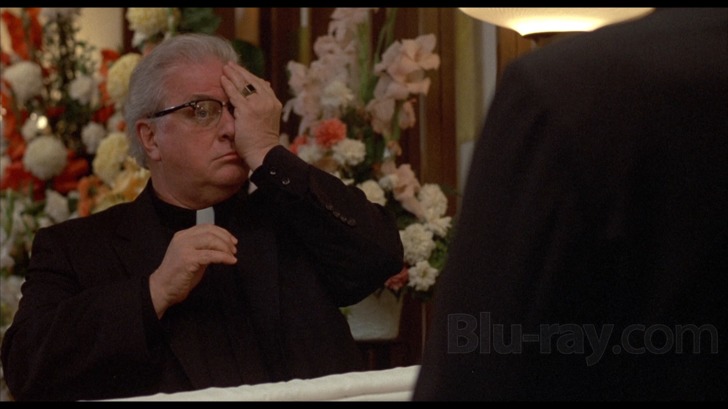
Sutherland is really the only reason to watch "The Rosary Murders," and while his actual performance is awkward, at least he's trying, infusing Robert with boyish qualities as the priest carries himself like a teenager, lighting up after female attention and playing the part of a good guy to protect others. Sutherland seems to be aware that the production is sinking, working to make the most of his scenes with a full-bodied performance, trying to visibly communicate what the writing ignores. The actor is the best part of "The Rosary Murders," delivering a human touch to a cold, lifeless picture, and one that certainly had the opportunity to embrace its pulpy origins and roll ahead with exploitative excitement.
Similar titles
Similar titles you might also like

The Snowman
2017

The Outsider: The Complete First Season
2020

The Raven
2012

Jack the Ripper 4K
Slipcover in Retailer Edition
1959

The Psychopath
1966

Evidence
2013

A Kind of Murder
2016

Manhunter
Collector's Edition
1986

Elsewhere
2009

Fear City
1984

Proxy
2013

Cruising 4K
Limited Edition
1980

The Cat o' Nine Tails 4K
Il gatto a nove code | Special Edition
1971

The Fatal Hour
1940

Watch Me When I Kill
Special Edition
1977

The Watcher
2000

When a Stranger Calls
Retro VHS Collection
1979

The Black Belly of the Tarantula 4K
La tarantola dal ventre nero
1971

Psych:9
2010

Scream and Scream Again
1970